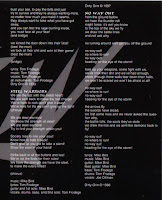
After their 1989 tour with New Order and Public Image, The Sugarcubes traipsed to the United States to record their third album. Treating the tour much like they treated their whole musical career, Bjork beamed over the experience: "It was a great tour with no responsibility. We only had to play every other day, and all we had to do was smile at John Lydon when he was puking."
This whimsical attitude spoke itself from the very beginnings of the band's lifespan. As Einar Orn recollects: "We've always done other things, and when all this hullabaloo about the Sugarcubes started, we were 85 per cent doing our paid jobs and 15 per cent doing the Sugarcubes for fun. Then we became the Sugarcubes 100 percent for pay." At the time that the third album was released, they were still working day jobs back home in Iceland.

Derek Birkett, ex-bass player for Flux Of Pink Indians and founder of the record label One Little Indian Records, found their meanderings absolutely exasperating. In an interview, he recounted his working relationship with the band: "Fucking impossible to deal with. I love what they are doing, but they are the only band I've ever worked with for whom the band isn't the priority. That's why they all went off and got jobs. We operate a profit-share, but when they made money they'd blow it in ridiculous ways. Like last year, when they brought out a poetry book which cost £8 to buy and £18 to produce." There was a constancy in this approach to their spending of money. Another example was the night that Bjork walked into a club, handed the bartender her credit card and invited random people throughout the club to have drinks on her tab.

When asked what the title Stick Around For Joy was all about, Siggi, the drummer, chimed in and explained that the title was the result of a phenomenon they encountered while visiting Japan. This phenomenon, dubbed by the band as "Japanese Flu," was a reference to the Japanese habit of speaking English in American advertising slogans such as "have a Coke and a smile." During a drunken card game, the band members were tossing epithets of this sort at one another and Siggi, despondent over a bad hand, blurted out "
Stick around for joy" as he threw his cards down on the table.



 Cheers!
Cheers!



